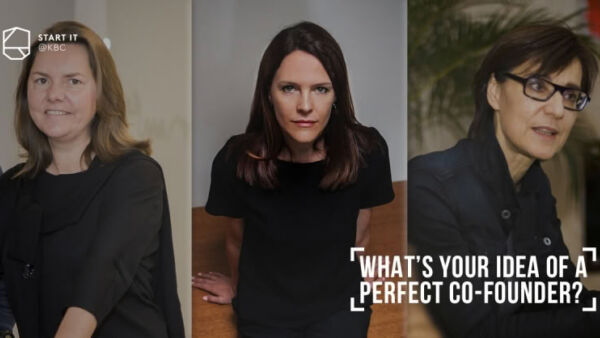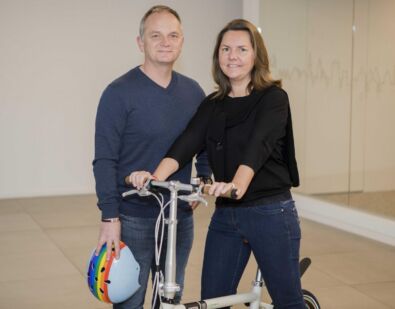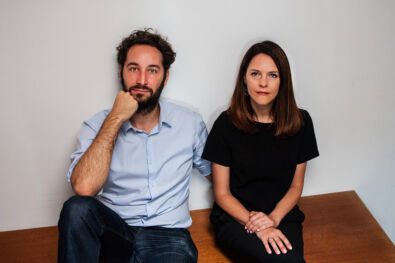The perfect co-founder: your husband, your wife or a total stranger. There is no golden formula

Nathalie Boileau founded Cycle Valley with her husband, Leen Segers didn’t even know her co-founder at LucidWeb up until one year ago. There is no waterproof formula for the perfect co-founder. But whether you are married to your co-founder or you have a marriage of convenience, next to the right fit there is one golden rule: good agreements make good friends. “Ownership, money, time investment, responsibilities, ambition level,…: the expectations of every co-founder need to be very clear and very similar.”

The partner
Nathalie Boileau founded Cycle Valley together with her husband Wim. They offer bike services for companies. The company leases the bikes or buys them in a group purchase, Cycle Valley takes care of everything: the delivery, the maintenance, the breakdown assistance,… “We answer to a growing need for alternative, more sustainable means of transportation. Not just for daily commuting, but also for logistics. A lot of times, the bike is faster than a car or a van. With way less pollutant emissions and way less stress for the driver.”

Right from the premature idea stage of what later would become Cycle Valley, Nathalie and Wim were in it together. “A lot of friends called me crazy: ‘I would never do this with my husband, it would be the shortest way to a divorce (laughs)’. I understand their reactions, but for us, it works out very well. I could not do this startup thing with anyone else.”
The stranger
Nathalie founded a startup with the person she knows best. Leen Segers chose a totally different approach for her startup LucidWeb, a web platform for VR players. “We want to make it easy for everyone to get into virtual reality. I have been dreaming of building my own company since years, but due to personal reasons I postponed it until I did no longer find an excuse to not do it.

All my earlier experiences – at Netlog, at several media companies in the UK, or again in Brussels for tech.eu - slowly led up to the foundation of LucidWeb. As the original co-founder stepped away in 2017 and I decided to continue on my own, it's only logical that I am inclined to consider LucidWeb as my startup, my baby.
“But as LucidWeb is a software technology company, it was crucial to get a new technical co-founder on board. Hub.brussels, an organization that supports startups in the audiovisual sector, introduced me to Fabien. When we first met, I introduced the vision of the company to Fabien. He took some time to research the goals and tech requirements, but quickly agreed there was an opportunity.When we were granted funding from Imec for the prototype we built together, Fabien became my co-founder. (laughs) And although a lot of people seem to think the opposite, we are not a couple. Next time, I will take some more distance when we shoot the team photos!”
“Most pre-seed funding initiatives only support young startups when the business is co-founded with at least two people. If this wasn't a requirement, me and Fabien would not have jumped into the new business the way we did. But looking back, this has proven to turn out quite well as the collaboration immediately went much deeper. The level of involvement is certainly higher.”
No misconceptions, no false expectations
From a total stranger to a co-founder in a few months’ time, that calls for solid agreements. “From day one, it was clear for both of us that LucidWeb is not a 50/50 story. I started investing time and money one year before Fabien stepped in. I took risks one year earlier, my family helped funding when money fell short. These risks obviously had an influence on the agreements we made.”
At Cycle Valley, Nathalie and Wim share everything. “There has never been any doubt it, we both own a 50 percent share of Cycle Valley. But it’s absolutely true that you need clear agreements. In a startup everyone does a little bit of everything, but in general our tasks are well divided. I manage the legal part, the marketing, the communications,.. Wim handles the financials, the sales, the external relationships,… After 10 years of marriage, we know each other’s strengths and weaknesses through and through. We know how to split responsibilities in a way that works best for the company.”
“A clear division of the tasks between the co-founders is indeed essential”, Leen emphasizes. “I had another co-founder before Fabien, but after 8 months I had to admit it didn’t work out. The distance between Brussels – where I live – and Lille – where we decided to base LucidWeb at first – was part of the reason, but what could have influenced the break-up was that our preferred learning curve was overlapping. Besides being a highly skilled developer, Thomas also gained knowledge in startup founding skills, after following a business program at Plaine Images.
Hence, we were both eager to lead the corporate development activities, and amongst other differences, we realised it would be better to go our separate ways.”
“With Fabien, the situation was completely different, from day one. He came in at a later stage and his role was clearly defined as a technical co-founder. Our skills are 100% complimentary. There is no overlap.”
The madness never stops
Starting a company with your partner is obviously tricky, Nathalie admits. One hell of a relationship test, and a huge financial risk. “I know that we could have chosen an easier, more comfortable life. (laughs) Like the one we had before. starting a company with your partner is risky as well. When other startups fail, the founders might still have a partner and a second income to fall back on. Cycle Valley is all or nothing. When we fail, we both end up without a job. But hey, we knew what we were getting ourselves into. And although we are extremely hungry to turn Cycle Valley into a success, we didn’t just rush into this head over heels.”
One of the main advantages of co-founding a startup with your partner, according to Nathalie, is the open communication. “I can imagine in other companies, frustrations might bottle up because they are left unspoken. Wim and I tell each other everything, straight in each other’s face. No detours, no velvet gloves. We can work a lot more efficient that way, we don’t lose time mincing words.”
“The downside is that the madness never stops. We try to separate Cycle Valley from our private life, but in all honesty that’s an illusion. Cycle Valley is such a huge part of our lives, we still talk about our challenges, our obstacles and our ambitions at the breakfast or dinner table. Luckily, our 8 year old son sometimes calls us to order: ‘No work!’ And to make sure we don’t end up in a bubble with just the two of us, we also installed a supervisory board that challenges us and feeds us with advice.”
Who’s the boss?
A a startup with one or more co-founders, rests the question who is ultimately in charge? Who’s the boss? “I am the CEO, but that’s not written in stone”, Leen says.
“Today I am called the CEO mostly because investors prefer to see the roles confirmed from the very beginning. If the roles are not clearly defined, it could indicate potentially lengthy discussions in the future. Fabien's title is LucidWeb's technical co-founder, indicating as well that a CTO is not part of the co-founding team yet. A third person will join, leading the development of the platform. But building a startup is not at all about titles. Although I have the CEO title, during my career, I never spend so much time on pure admin tasks aka "putting the bin out". As a founder, you just want to make the company successful while creating a fun and interesting working environment. It’s my role to establish that. If one day the board of directors decide that the company would benefit from a new CEO, I would be happy to step down. It’s a quite common scenario in the startup world.”
Cycle Valley has no CEO, Nathalie says. “Or two CEO’s, (laughs) I don’t really know. Wim is more visible, maybe the outside world sees him as the CEO, I couldn’t care less. What’s in a name?”
Véronique Bockstal: ‘The search for the right fit’
Véronique Bockstal is a serial startup entrepreneur. She is frequently asked as a mentor for startups (for Start it @KBC, among others) and with her brand new company Outgrow, she provides hands-on support to female-founded startups in order to help them scale faster. Véronique is also the founder of Female F(o)unders Belgium, a community restricted to female founders and entrepreneurs and not open to C-level managers like many other female networks. “Only those who really have skin in the game are allowed.”

From her experiences with female entrepreneurs she gets the impression that women are more hesitant to join forces with one or more co-founders than male founders. “It’s not that they are not open to the idea of a co-founder, far from it. But they are being very hard on themselves, they often don’t feel ready yet. Not just for a co-founder, but also for funding or for speaking in public for that matter. They apply the 95/5 instead of the 80/20 rule. Things have to be almost perfect which makes that female founders often move slower.”
“I don’t necessarily believe every founder needs a co-founder. But I do believe you need to surround yourself with a supporting network. It can get very lonely as a single founder. The advantage of joining a network like Start it @KBC for instance is not the advice or the mentorship, but seeing everyone else going through the same struggles to get their business off the ground.”
After having sold her first start-ups, Véronique tried to join an existing start-up as a co-founder twice, but failed to do so. “A single founder who already started out is heavily involved in his or her business emotionally. The fear of having to share their baby and their equity often prevents them from bringing in another founder. It was tough to negotiate the equity part. What is a fair split for someone who joins the business one or two years down the line given it’s difficult to put a value on a young venture? Is it 80/20? 70/30?”
“(laughs) Even with my own wife, starting-up wasn’t easy. We found out, after we had started, that our ambitions were different. I saw things bigger and was prepared to accept external funding while she approached things more carefully and was less in favour of allowing others to join in. When it comes to co-founders, it is crucial to have the right fit, personally and professionally.”
Despite her Female F(o)unders Belgium initiative, Véronique is very much in favour of mixed founder teams. “Men and women bring in different but complementary skills and views. And mixed teams prove to score better results than male-only teams for instance.”
More information on growing your startup and how Start it @KBC can help you with this? Register for our webinar on Tuesday, September 11th from 12h15-13h00.
Easy access to the webinar through your smartphone or PC!